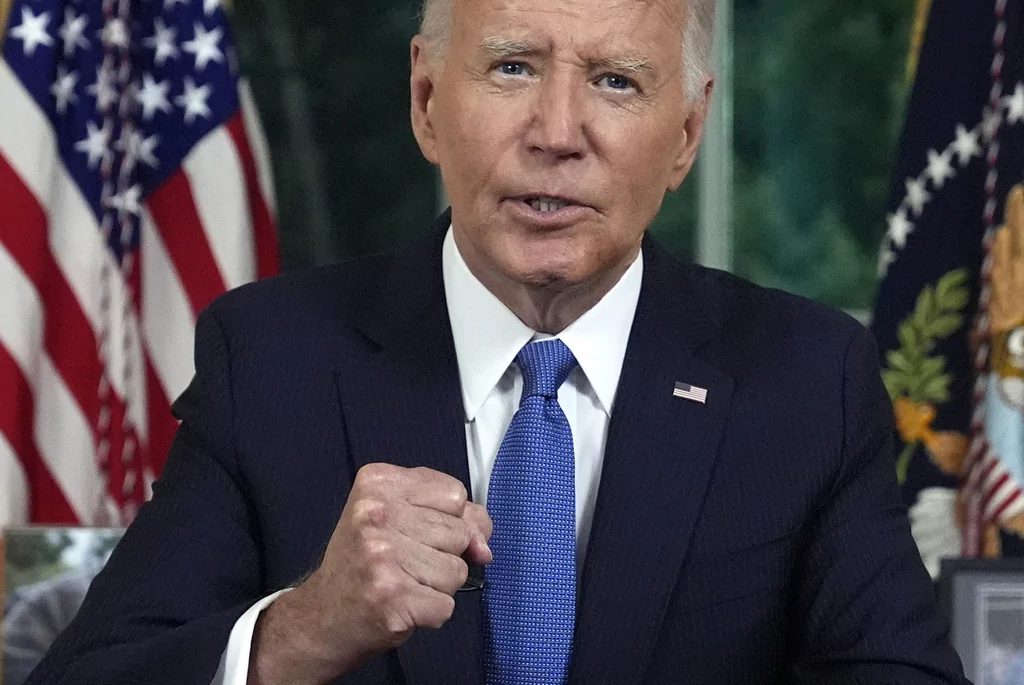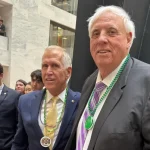

President Joe Biden may have left the central question, why he quit his reelection bid, unanswered during his Wednesday evening address to the nation, but he did lay out some priorities for his final six months in office.
“I’ll be focused on doing my job as president,” Biden said. “That means I’ll continue to lower costs for hardworking families, grow our economy. I’ll keep defending our personal freedoms and our civil rights, from the right to vote to the right to choose. I’ll keep calling out hate and extremism and make it clear there is no place in America for political violence or any violence ever, period.”
Biden announced his historic exit with a social media post Sunday afternoon, then followed that with an 11-minute Oval Office speech that was supposed to provide more clarity about why he left. The president remained vague on that topic, saying, “Nothing can come in the way of saving our democracy. That includes personal ambition.”
However, he did set out some concrete policy goals for the final eighth of his term.
Cancer moon shot
“I will keep fighting my for my cancer moon shot,” Biden said before the cameras in his West Wing office. “So we can end cancer as we know it because we can do it.”
Biden has a long history of backing cancer research, dating to the tragic 2015 death of his eldest son, Beau Biden, from an aggressive form of brain cancer. Biden launched the first cancer moon-shot initiative during his last year as vice president, then founded the Biden Cancer Initiative as a private citizen, and relaunched the cancer moon shot after becoming president.
The cancer moon shot includes university research projects and grants, with a long-term goal of improving the prevention and treatment of the disease. The work is certainly not going to be finished within the next six months, but the president may also focus on his private cancer research initiative after leaving office.
Supreme Court reform
Probably the most meaty policy proposal Biden mentioned was a goal of reforming the Supreme Court, which has become a target of criticism from progressives who say that high court justices need to be held to a higher standard of ethics.
“I’m going to call for Supreme Court reform,” Biden said, “because this is critical to our democracy, Supreme Court reform.”
However, the Biden White House has kept details of its reform goals under wraps, even from some key Senate Democrats who would be instrumental in implementing it.
Several Democrats on the Senate Judiciary Committee surveyed by the Washington Examiner said they have not heard from the White House on the matter despite weeks of reports on the subject, including the panel chairman.
“I haven’t heard anything directly from the White House,” said Sen. Dick Durbin (D-IL), the chamber’s No. 2 Democrat as majority whip. However, another Senate Democrat, Sen. Sheldon Whitehouse (D-RI), did say he’d been in contact with the Biden administration.
Either way, even if he gets his own party on board for reforms, Biden will face pushback from the GOP.
“It’s a separate branch,” Sen. Mitt Romney (R-UT) told the Washington Examiner of efforts to reform the judiciary. “Keep the nose of Congress and the administration out of it.”
Peace in the Middle East
“I’m going to keep working to end the war in Gaza, bring home all the hostages, and bring peace and security to the Middle East and end this war,” Biden said in his Oval Office address.
This goal, too, may rest more on outside factors than on anything Biden himself is able to do between now and Jan. 20, 2025, when he leaves office.
Biden and key members of his administration have been calling for a ceasefire in Gaza for months, but those calls have come with terms to which Hamas, the terrorist organization that controls the strip, has not agreed.
As of early July, Biden said Israel and Hamas were making progress toward an agreement, but nothing has been announced nearly 10 months after the Oct. 7 terrorist attacks sparked the war.
CLICK HERE TO READ MORE FROM THE WASHINGTON EXAMINER
Complicating matters now is that Biden is already sharing the spotlight with Vice President Kamala Harris, who took over the campaign after Biden stepped aside. Harris also met with Israeli Prime Minister Benjamin Netanyahu Thursday evening and delivered a somewhat harsher message, saying she will not “look away in the face of these tragedies” stemming from Israel’s campaign in the Gaza strip.
A senior Israeli official warned that those comments could derail the ceasefire talks, telling the Times of Israel that “the more the gap widens between [the U.S. and Israel], the more we move away from a deal and thus also increase the possibility of a regional escalation.”





